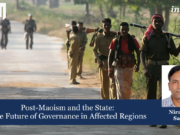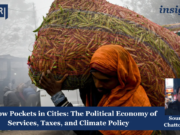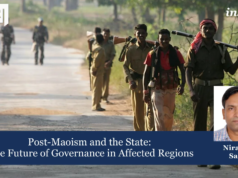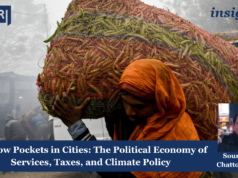Press Release
Ishan Singh
The IMPRI Center for the Study of Finance and Economics (CSFE), IMPRI, Impact and Policy Research Institute, New Delhi, hosted an interactive panel discussion on the topic “Rural Realities and Union Budget 2024-25” on 27th July 2024, under IMPRI 5th Annual Series of Thematic Deliberations and Analysis of Interim Union Budget 2024-25, as part of IMPRI #WebPolicyTalk.
The session was chaired and moderated by Dr J Dennis Rajakumar, Director, Economic and Political Weekly Research Foundation (EPWRF), Mumbai. In response to the recent announcement in the Budget 2024-25, which raised the rural wage rate from Rs. 535 to Rs. 590, Dr. Rajakumar, a distinguished expert in rural economics, has expressed concerns about the effectiveness of this increase.
He points out that while the nominal increase in wages may appear substantial, it fails to keep pace with the overall inflation rate, rendering the rise illusory. The wage increase does not reflect the real cost of living for rural workers. Inflation has eroded the purchasing power of rural households, and the rise from Rs. 535 to Rs. 590 is insufficient to meet their basic needs.
Moreover, there is a growing softness in rural policy focus. “Not all is well in the rural sector,” he asserts. “The government must take a more holistic approach to address the underlying issues affecting rural communities, including access to quality healthcare, education, and sustainable employment opportunities.”
Prof. R S Deshpande, the next panelist, has raised critical concerns regarding the current state of rural development and the agricultural sector. He highlights that the growth rate in agricultural production continues to lag due to factors such as high commercialization and the introduction of new crops, which are not adequately supported by effective supply chain management. Despite the budget’s inclusion of supply chain initiatives, rural priorities remain neglected. There is a need for market reforms and reliable wage data to address issues related to pricing, market access, and labour availability. The migration of rural labour to urban construction jobs has exacerbated rural poverty, with approximately 5 million cultivators leaving agriculture due to schemes like MGNREGA.
He also notes that while inflation’s impact on the rural sector has been minimal, the market margins for middlemen and aggregators have increased substantially, often at the expense of farmers. Cooperative efforts have failed, leading to government inefficiency and misplaced financial burdens. Furthermore, the failure of programs for oilseeds and pulses, coupled with the reluctance of farmers to adopt climate-resilient practices, underscores the urgent need for more effective and supportive policies. He calls on policymakers to prioritize rural development holistically, ensuring reforms are market-driven and supportive of sustainable agricultural practices.
Prof CSC Sekhar, the next panelist, highlights that The recent budget announcement has left stakeholders in the agricultural sector both excited and disappointed. While the appointment of a new minister dedicated to agriculture signals a promising focus, the holistic approach needed for rural development appears lacking. Experts note that there is hardly any continuity in programs and schemes, which is crucial for the sustainable development of agriculture as the central pillar of the rural economic ecosystem. The revised estimates being lower than the budgetary estimates further dampened expectations.
There is a pressing need for better coordination between various social development initiatives, such as the National Rural Livelihood Mission (NRLM) and self-help groups, to ensure effective handholding and economic activities. The current disjointed efforts are not conducive to supporting rural development. Despite the significant spending on digital public infrastructure, the emphasis on extension services must be increased. Stakeholders remain hopeful for more robust programs for pulses and oilseeds to be introduced. The potential of the budget will only be realized if comprehensive and coordinated strategies are implemented to support the agricultural and rural development sectors effectively.
Dr Donthi Narasimha Reddy, Member, State Advisory Committee, Telangana State Electricity Regulatory Commission, talks about the Stakeholders in the agricultural sector who have expressed mixed reactions to the recent budget announcement. While the appointment of a new minister for agriculture is a positive development, the budget’s lack of a holistic approach to rural development is concerning. There is a significant allocation for interest payments, railways, and defence, but debt levels have crossed limits, leaving little room for capital formation.
Additionally, the impacts of climate change on vulnerable communities have not been adequately addressed, with no clear allocation for mitigation and adaptation efforts. Recent damages and losses remain unacknowledged, and the nine priorities outlined in the budget are surprising and unclear.
The economic survey fails to provide a comprehensive understanding of environmental concerns and job losses due to the energy transition. There is a noticeable lack of incentives for protecting livelihoods and existing rural employment. The allocation of ₹10,000 crores largely benefits companies, while the handloom sector, which employs 50 lakh people, received a mere ₹200 crores. This disparity raises concerns about the budget’s effectiveness in supporting rural development and addressing the needs of vulnerable communities. A more coordinated and inclusive approach is essential to ensure sustainable growth and resilience in the agricultural sector.
Dr Jawed Alam Khan, the next panelist, emphasizes that the Stakeholders are urging the government to revamp the budgeting process to prioritize Panchayati Raj institutions and ensure proper lead assessment, program outputs, and outcomes. The current budget is stagnant in terms of allocation, failing to address the needs of critical schemes such as Pradhan Mantri Awas Yojana and MGNREGA, which are vital for rural development.
The National Rural Livelihood Mission (NRLM) has seen minimal increases, and the once flagship scheme, Gram Swaraj Abhiyan, is now underfunded. This lack of financial support undermines efforts to empower rural communities and foster sustainable growth. A more dynamic and inclusive approach to budgeting is essential to ensure that funds are allocated effectively and reach the grassroots level, ultimately supporting the holistic development of rural India.
Mr Ramanjaneyulu GV, Executive Director, Centre for Sustainable Agriculture, Telangana, talks about The recent budget allocation for the natural farming scheme which has been deemed insufficient, highlighting the need for a government re-evaluation. A shift towards natural farming is crucial for sustainable agricultural practices, yet current funding levels fall short of supporting this transition. Additionally, there are significant concerns regarding the accountability of the research system, which remains focused on developing new crop varieties rather than addressing soil fertility issues.
This outdated approach needs reform to better support agricultural sustainability. In terms of livelihood programs, while numerous initiatives exist, the budget lacks the necessary provisions to support farmers and youth comprehensively. The current budget falls short of expectations, failing to provide the end-to-end support required for effective rural development. There is an urgent need for a more strategic and well-funded approach to address these critical areas, ensuring that both natural farming and research advancements can contribute to a more resilient and productive agricultural sector.
Prof Gummadi Sridevi, Professor, School of Economics, University of Hyderabad, highlights that The recent budget raises significant concerns about its impact on marginalized communities and the future of agricultural development. The low spending on research and development (R&D) in agriculture, coupled with a shift from the mid-day meal scheme to a different program, threatens to undermine efforts to address food and nutrition needs. This is particularly worrying given the rising unemployment and underemployment rates, and the increased participation of women in the labour force, especially in unpaid family labour in rural areas.
The budget’s insufficient focus on agricultural R&D and its implications for climate change could adversely affect wages and exacerbate food insecurity. With malnutrition levels remaining alarmingly high among Scheduled Tribe groups, there is skepticism about whether the ambitious target of a “Viksit Bharat” can be achieved. The lack of a targeted, regional approach to food security and nutrition may further hinder progress. A more strategic investment in agricultural research and comprehensive support for marginalized communities is crucial to ensuring that the goals of sustainable development and improved nutrition are met effectively.
In summary, The recent budget has drawn mixed reactions, particularly concerning its impact on agriculture and rural development. Key concerns include insufficient funding for natural farming schemes and a stagnant budget allocation for crucial programs like Pradhan Mantri Awas Yojana and MGNREGA. The National Rural Livelihood Mission (NRLM) and Gram Swaraj Abhiyan are underfunded, undermining efforts to support rural communities effectively. Stakeholders argue for a comprehensive review of the budgeting process to ensure proper support for Panchayati Raj institutions and effective program outcomes.
Additionally, the low investment in agricultural research and development (R&D) is alarming, especially as climate change threatens agricultural stability and food security. The shift away from mid-day meal schemes and inadequate support for vulnerable communities, including high malnutrition rates among Scheduled Tribe groups, further exacerbate concerns. Rising unemployment and underemployment, particularly among women in rural areas, highlight the need for better-targeted support and opportunities. There is a call for a more strategic, well-funded approach to address these issues comprehensively and ensure sustainable development and improved nutrition for marginalized communities.
IMPRI’s 5th Annual Series of Thematic Deliberations and Analysis of Union Budget 2024-25
IMPRI’s 5th Annual Series of Thematic Deliberations and Analysis of Union Budget 2024-25
Watch the event at IMPRI #Web Policy Talk
Rural Realities and Union Budget 2024-25
Acknowledgement- The article is written by Ishan Singh, a research intern at IMPRI pursuing his bachelor’s degree in B.A. (Hons.) Political Science from Kirori Mal College, University of Delhi.



















